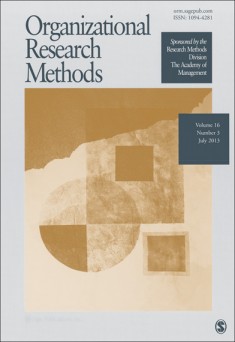Defining and Exploring Boundary Conditions
 While it is easy to agree that boundary conditions are an important part of theory development and research, it is not as easy for researchers to agree on what boundary conditions are, and how they should be approached. With the recent Organizational Research Methods article entitled, “Boundary Conditions: What They Are, How to Explore Them, Why We Need Them, and What to Consider Them,” authors Christian Busse, Andrew Kach, and Stephan Wagner set out to not only better define boundary conditions, but also understand how exploring boundary conditions can lead to improved research and further theory development.
While it is easy to agree that boundary conditions are an important part of theory development and research, it is not as easy for researchers to agree on what boundary conditions are, and how they should be approached. With the recent Organizational Research Methods article entitled, “Boundary Conditions: What They Are, How to Explore Them, Why We Need Them, and What to Consider Them,” authors Christian Busse, Andrew Kach, and Stephan Wagner set out to not only better define boundary conditions, but also understand how exploring boundary conditions can lead to improved research and further theory development.
The abstract for the paper:
Boundary conditions (BC) have long been discussed as an important element in theory development, referring to the “who, where, when” aspects of a theory. However, it still remains somewhat vague as to what exactly BC are, how they can or even should be explored, and why their understanding matters. This research tackles these important questions by means of an in-depth theoretical-methodological analysis. The study contributes fourfold to organizational research methods: First, it develops a more accurate and explicit conceptualization of BC. Second, it widens the understanding of how BC can be explored by suggesting and juxtaposing new tools and approaches. It also illustrates BC-exploring processes, drawing on two empirical case examples. Third, it analyzes the reasons for exploring BC, concluding that BC exploration fosters theory development, strengthens research validity, and mitigates the research-practice gap. Fourth, it synthesizes the analyses into 12 tentative suggestions for how scholars should subsequently approach the issues surrounding BC. The authors hope that the study contributes to consensus shifting with respect to BC and draws more attention to BC.
You can read “Boundary Conditions: What They Are, How to Explore Them, Why We Need Them, and What to Consider Them” from Organizational Research Methods free for the next two weeks by clicking here. Want to know all about the latest research from Organizational Research Methods? Click here to sign up for e-alerts!






















































































